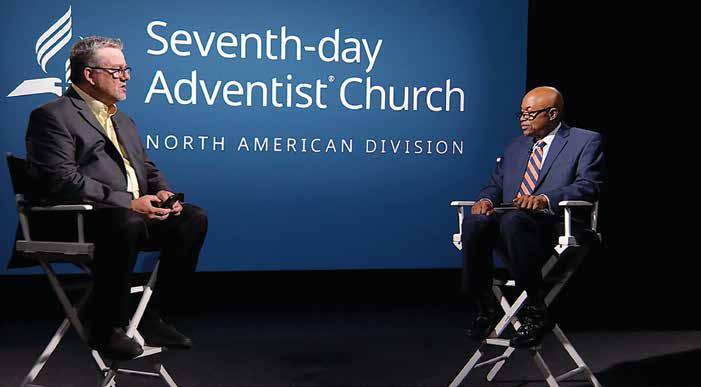
11 minute read
A Bible Quiz for G. Alexander Bryant
A Bible Quiz for
INTERVIEWED BY RICARDO GRAHAM
Graham: We are glad you are willing to participate in this Bible Quiz for our Recorder readers. Now, it’s actually an interview disguised as a Bible Quiz, but the format allows us to anchor the interview squarely in the Scriptures, and it affirms the foundational alignment between our work here in the Pacific Union and the work that you are leading in the North American Division.
Bryant: I’m ready!
Graham: The first question is about justice. The prophet Amos wrote, “But let justice roll on like a river, righteousness like a never-failing stream!” (Amos 5:24). What do those words mean to Seventh-day Adventists in 2020?
Bryant: Amos calls for justice to go forth to everyone, just as the blessings of a river flow freely to all without regard to race, gender, age, or background. It will roll on with or without us. We don’t own justice, just as we don’t own the river. The owner of the river and the owner of justice is God, so how should we, His children, handle that which belongs to Him? Our God is a God of justice, and He calls for His children to be like Him. This text gives us our marching orders in terms of the church’s voice and actions on the side of justice. We can’t help but be involved.
Graham: The Psalmist wrote, “Praise the Lord, my soul, and forget not all his benefits—who forgives all your sins and heals all your diseases, who redeems your life from the pit and crowns you with love and compassion” (Psalm 103:2-4). What do these words mean for us in the age of the coronavirus pandemic?
Bryant: We can take great hope and peace from this Psalm. It reminds us that God is in control and He has the power over any disease. My heavenly Father crowns me with His love and compassion—even as the pandemic is swirling all around me. God has the ability and the desire to give us peace and contentment.
Graham: Question three is about service. Jesus said, “For who is greater, the one who is at the table or the one who serves? Is it not the one who is at the table? But I am among you as one who serves” (Luke 22:27). Why are these words from Jesus about service so important for Adventists?
Bryant: I believe this passage is important for Adventists because of two things. First, we place a high premium on positions in our local church, conference, union, division, and the GC. However, Jesus’ teachings continually and consistently call us not to positions but to service. Second, we see ourselves at the table. Because of our doctrines and possession of the truth, we sometimes view ourselves as the favored children in the house. Yet, as He did with the disciples, time and again Jesus must call us back to service.
Graham: The prophet wrote, "Ah, Sovereign Lord, you have made the heavens and the earth by your great power and outstretched arm” (Jeremiah 32:17). How should we relate to the world that God has made?
Bryant: Seventh-day Adventist need to understand that we are stewards of this earth—not owners or masters, just stewards. This will help us keep in mind that the owner, our heavenly Father, is sovereign. He does not need our permission, nor does He always explain to our satisfaction what he is doing and why He is doing what He is doing. I know for some of us that is very difficult to accept, but if we remember our role and His role it becomes a bit more palatable. We must trust that the God who made everything and controls everything loves us with an everlasting love, and no good thing will He withhold from us.
Graham: Paul writes, “Do not conform to the pattern of this world, but be transformed by the renewing of your mind. Then you will be able to test and approve what God’s will is—his good, pleasing and perfect will” (Romans 12:2). How are we to relate to the myriad pressures of modern life?
Bryant: We must live in close and consistent relationship with God. We must find ways to stay in His presence. We must build time into our day to stay in communion with God—for without that close communion, the pressures of life will sweep us into a place far away from God. If we don’t spend time with God on a personal basis, then He doesn’t have an

opportunity to shape our thinking, to impress our minds in a different way than does the world and the environment around us. When our minds are more aligned with His, then we are able to see the world and its problems more as God sees them. In this manner, God lifts us above this earth and the things in it. We see through His eyes and not our own—and things seem a lot more in control from that vantage point.
Graham: Question six is about the equality of all believers. Paul states, “So in Christ Jesus you are all children of God through faith, for all of you who were baptized into Christ have clothed yourselves with Christ. There is neither Jew nor Gentile, neither slave nor free, nor is there male and female, for you are all one in Christ Jesus” (Galatians 3:26-28). How does this text translate into faithfulness in our life together as Adventists?
Bryant: This passage challenges us to see each other as God sees us—to take off the filters that we inherited as children or acquired through time. Christ becomes the common denominator for all people and all people groups. He tears down the artificial barriers between brothers and sisters in the Lord. The disciples had some serious issues with the Gentiles and Samaritans. They did not
see them as children of God. Yet, Jesus called those disciples, even though they had these biases and prejudices. Jesus had an intentional and well executed plan to address the issue. He showed them in the way He dealt with the woman at the well, in the feeding of the 4000, in healing the ten lepers. Jesus may have found them with their prejudices, but He loved them too much to leave them there. Even with Jesus as the teacher, change didn’t come overnight. The Holy Spirit continues to tear down walls and barriers of separation until we can be the family that God intended.
Graham: The words of the prophet Joel are repeated in the book of Acts: “I will pour out my Spirit on all people. Your sons and daughters will prophesy, your old men will dream dreams, your young men will see visions. Even on my servants, both men and women, I will pour out my Spirit in those days” (Joel 2:28-29). What is your message to young

people in this moment?
Bryant: My message to young people is to please continue to hold on. If you get a bit impatient with God’s church, don’t get impatient with God. It is His church and He will eventually mold it and shape it to be what He wants it to be. He needs and we need the young adults to help in this process. God has singled you out! He has called out your generation in Joel 2:28. You can’t reform the church from without; you can only make meaningful change from within. So please don’t leave because things are not right—stay because things are not right!! Then make up your mind to change things—one church at a time, one pew at a time, one elder at a time, one member at a time. This text says God will grant you His Spirit in the last days to be the church God wants to usher in His soon return. The movement that is rocking this world now was spurred on by young people.
God knows the power the youth can have for good! God needs you! We need you!
Graham: The words of the Ten Commandments are familiar to all of us, “Remember the Sabbath day by keeping it holy” (Exodus 20:8). What is the importance of the Sabbath to our society, our world—and to the Seventh-day Adventist church?
Bryant: The Sabbath reminds us that God is our Creator; therefore, we owe everything to Him, everything is subject to Him, nothing is too big for Him, no problem is too complex for Him to solve, and there is no relationship so contorted that He can’t untangle it. The Sabbath is doing its best work in my life, not by the things I refrain from doing but by causing me to pause and be reminded of who God is and who I am in God! When I understand that God is the Creator and Designer of all things and He is my Father, it gives me a different perspective on the challenges of life. As a human being, I tend to get caught up in the business of living and forget about the One who gave me life. This can be true even in doing the work of God. However, the precious Sabbath brings me back again to Him. When I am really keeping the Sabbath, I am grounded by the renewed knowledge of who God is and who I am in God.
Graham: Speaking to His disciples, Jesus said, “All authority in heaven and on earth has been given to me. Therefore go and make disciples of all nations, baptizing them in the name of the Father and of the Son and of the Holy Spirit, and teaching them to obey everything I have commanded you. And surely I am with you always, to the very end of the age” (Matthew 28:18-20). In this cynical age, with trouble on every side, do we have a relevant role? How should Seventh-day Adventists respond to the Great Commission?
Bryant: Yes, the church has an even greater role today. We must connect society’s needs and the Great Commission of Jesus—we have a message of hope and certainty. The certainty is peace that only God can give in uncertain times. In order to receive this peace, people must accept the Peace Giver. We must learn to couch our message in terms where people are today. We live in an age where people don’t trust the government, they don’t trust the police, they don’t trust court system—why not ask them to trust God. He is the only unchangeable touchstone that we have. When all the social systems are failing us, what an opportunity to introduce Jesus as reliable, dependable, and trustworthy. We must be in it for people, however, and not for numbers. We must meet the human cry with the gospel and not be obsessed with just growing the church.
Graham: Question 10 is about the future. “Then I saw ‘a new heaven and a new earth,’ for the first heaven and the first earth had passed away” (Revelation 21:1). How should we approach the future?
Bryant: We should approach the future with great certainty! Everything we do must be done
On July 9, 2020, G. Alexander Bryant was elected the president of the North American Division (NAD) of the Seventhday Adventist Church. NAD Communication director Daniel Weber sat down with Bryant and discussed his new role and the events in his life that impacted his ministry. They also discussed the mission and future of the NAD. View more at https://vimeo.com/436307082.

in the light of a future kingdom. It will make us value things less and people more. The more real heaven is to me, the more easily I can value people more than things. The only thing God created in the first earth and the first heaven that will survive to the new heaven and the new earth will be people—those individuals for whom Christ died. The future is certain. The future is real. Embrace it, live for it, and take as many people with you as you can!
Graham: And now, a bonus question. The apostle Paul wrote, “How can we thank God enough for you in return for all the joy we have in the presence of our God because of you?” (1 Thessalonians 3:9). What message do you have for the members of the Pacific Union Conference?
Bryant: We thank God for your faithfulness in a time of profound uncertainty. God has equipped you to be His voice, His hands, and His feet in these uncertain times. When we hear of the work that you are doing in your communities and beyond, it is inspiring and encouraging! It elevates our spirits! It ennobles our minds. Thank you, my brothers and sisters in the great Pacific Union for adapting your methods, staying at your posts, and standing on the wall during these uncertain and unprecedented times. We pray for you always! May God bless you!
All Scripture quotations are from the New International Version.
Ricardo Graham is the president of the Pacific Union Conference.










